The battle against Covid-19 is a worldwide challenge unlike any in living memory. Even as Georgia Tech remains committed to serving our students, faculty, and staff, the Institute, Ivan Allen College of Liberal Arts, and other units across campus are contributing expertise, innovation, and an indomitable spirit to the effort.
Ivan Allen College faculty have accelerated our work to advance technology, deepen understanding of the impact and implications of Covid-19, help to save lives and improve outcomes locally and across the nation. Following are stories about research, scholarship, and helping efforts undertaken by the College and its partners on campus and beyond. We also invite you to read about the broader campus response to Covid-19. Together, we can do this.
Why Covid-19 Conspiracy Theories Spread
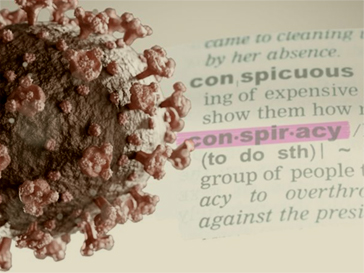
Why do so many people embrace Covid-19 misinformation? Does lack of health insurance discourage people from getting tested, even when testing is free? And what prevented doctors in Italy from sharing what they learned about oxygen levels, even though it could help predict which Covid patients were at the highest risk of dying?
Four faculty members in the School of History and Sociology (HSOC) at Georgia Tech are examining these questions and more to help craft effective policy responses to the pandemic.
Melkers Tackles Pandemic-Induced Social Innovations in New Research
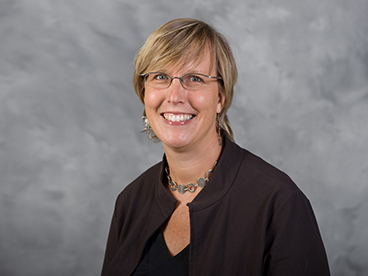
The coronavirus pandemic has been a global exhibit in mass adaptation in higher education, as millions of students and professors have taken their classrooms to the internet. Lab closures, travel restrictions, and other limitations forced researchers to go online, as well.
School of Public Policy Associate Professor Julia Melkers, whose scholarship has often focused on collaboration in academic settings, saw an opportunity in the upheaval. She and her colleague, Eric Welch of Arizona State University, are embarking on a two-year study of how scientific teams — particularly those collaborating internationally — adapted and innovated during the pandemic.
Ivan Allen College Researcher Shows Many in U.S. Faced Economic Hardship Due to Covid-19
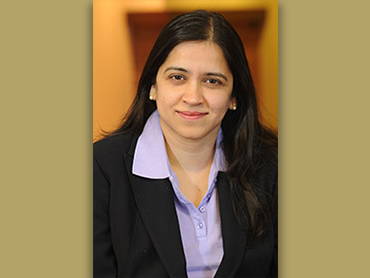
Shatakshee Dhongde, associate professor in the School of Economics, analyzed results of the Federal Reserve Board’s Survey of Household Economics and Decision-Making to determine the multiple economic deprivations experienced by respondents as a result of the Covid-19 pandemic for an article in the open-access journal PLOS ONE. Dhongde found that significant proportions of U.S. respondents were experiencing economic hardships even early in the pandemic, with Hispanics being particularly affected.
Covid-19’s Lessons for Sustainable Development
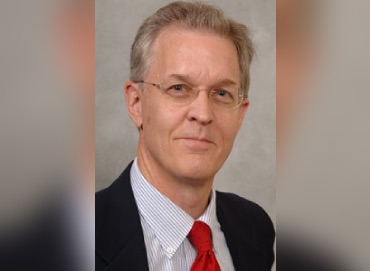
In an article posted to Preprints, Brian Woodall of the Sam Nunn School of International Affairs joined colleagues in the School of Civil & Environmental Engineering, Purdue University, and Arizona State University to consider the infrastructure and sustainable development implications of the COVID-19 pandemic.
The article, “Reflections on Pandemics, Civil Infrastructure and Sustainable Development: Five Lessons from Covid-19 through the Lens of Transportation.” was posted to Preprints on April 6. It already has been downloaded more than 500 times and viewed more than 1,000 times.
In the Race for Better Covid-19 Tests, Georgia Tech Expertise Plays a Crucial Role
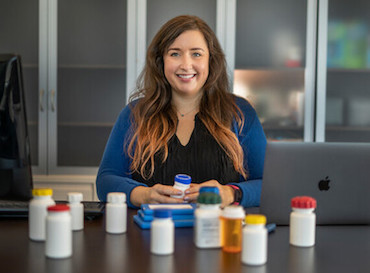
The HomeLab, housed in our School of Public Policy, is one of three campus units participating in a National Institutes of Health effort to rapidly identify new Covid-19 tests and bring them to market.
The units are working with the Atlanta Center for Microsystems Engineered Point-of-Care Technologies (ACME POCT) — which includes Georgia Tech, Emory University, and Children’s Healthcare of Atlanta — to vet candidate tests. The eventual widespread distribution of the test kits — which, in some cases, may offer almost instant results — of successful candidate tests could be key factors in helping limit spread of the disease, fully reopening the economy, and getting students back in classrooms.
Covid-19 Signals "The Urgent Need for a National Biosecurity Initiative"
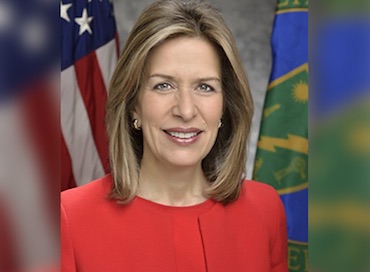
“As bad as the current crisis is, there is a pernicious prospect for which we are even less prepared: a deliberate wide-scale biological attack by an adversary,” wrote Nunn School Distinguished Professor Elizabeth Sherwood-Randall and John MacWilliams of Columbia University in an analysis published by the Belfer Center at Harvard Kennedy School. They state that United States leadership is needed now to deploy a bold new global biosecurity initiative that anticipates the increasingly sophisticated bio and genetic engineering technologies that can enable new weapons of mass destruction. Despite the billions of dollars spent on biosecurity, they warn that progress remains fragmented and not scaled. They recommend building upon the collaborations developed to address the COVID-19 pandemic and outline assets that can prepare us for what is “inevitably coming our way."
Health Insurance Shortfalls Could Contribute to Low COVID-19 Test Rates, Study Says

Lower rates of health insurance coverage were associated with substantially lower levels of testing for COVID-19 in the early days of the outbreak, — before Congress passed legislation making such testing free — according to a new analysis co-authored by Allen Hyde in the School of History and Sociology. Hyde’s analysis with lead author Angran Li of Zhejiang University in China shows that on a state-by-state basis, for each 3.1% drop in health coverage, the COVID-19 testing rate declined by 27.4% during March 2020, when the virus was rapidly spreading across the United States. The authors note the link between lower health insurance coverage and testing remained even after controlling for case rates, public health interventions, and demographic differences such as race and poverty rates.
School of Public Policy Professor Proposes Statistical Model for COVID-19 Reopening Decisions
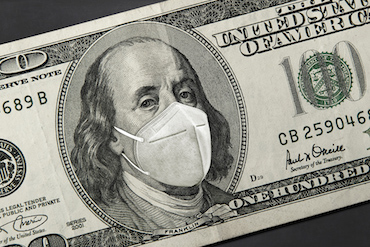
One of the sharpest controversies of the COVID-19 pandemic has centered on when it is safe to reopen state economies following outbreak-induced shutdowns. Scott Ganz, an assistant professor in the School of Public Policy, has proposed a solution to help answer that question. In a working paper for the American Enterprise Institute, Ganz proposes a statistical model to help state officials determine when they have met recommended threshholds for reopening the economy.
Health Economist Uses Imaging Data to Understand Pandemic’s Impact on Medical Sector
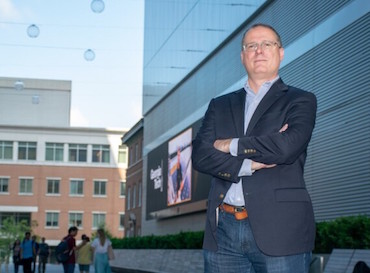
If you had to pick one tool that ties together just about every field of modern medicine, imaging technologies would be a good choice. After all these technologies —everything from x-rays to CT scans, are a part of many medical procedures, from routine checkups to sophisticated brain surgeries.
Danny Hughes, a health economist at the Georgia Institute of Technology’s School of Economics, is using data about how often such technologies are used to reveal the ways in which the Covid-19 pandemic has impacted the medical imaging sector, and how it might affect the health of Americans in the years to come.
School of Public Policy Researcher Explores Covid-19’s Impact on Child Welfare, Domestic Violence
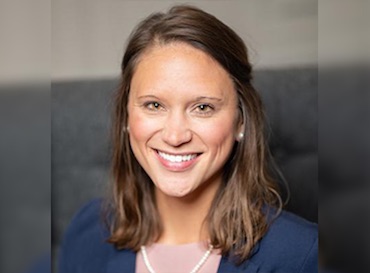
The Covid-19 pandemic forced schools and businesses to shut down, left millions out of work, and cooped up many families inside their homes for months on end. It is a combination that has led to an increase in child abuse and neglect and domestic violence — often in families with no history of such problems, according to School of Public Policy Assistant Professor Lindsey Bullinger.
Historian Co-Authors Book on Sports, War, and Pandemic
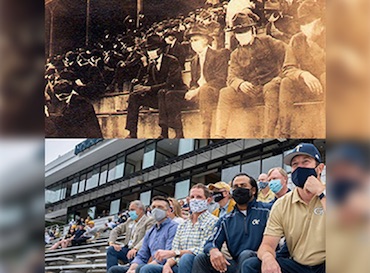
Historian Johnny Smith's new book was published just as Covid-19 began making the news. Published in March 2020, War Fever: Boston, Baseball, and America in the Shadow of the Great War, the book on how WWI and the pandemic of 1918 upended the world, and the world of sports, became a touchstone for how Americans survived and could do again. “Sports is all about the human experience, human connection,” Smith said. “I think people not being able to attend sporting events is symbolic of a larger sense of loss in America.”
Responding to Covid-19 In the Classroom
Faculty Turn to Podcasting to Teach Performance
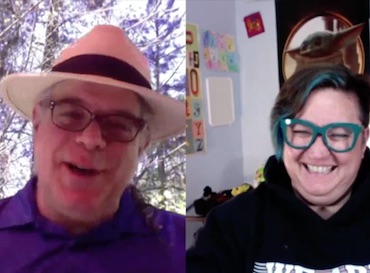
For Introduction to Performance Studies, LMC Professor Philip Auslander created audio podcasts on the week’s readings which he posted each Monday. He hosted follow-up discussions each Thursday via synchronous video conferencing. He used a similar approach for the Film Acting class he co-teaches with Melissa Foulger, but offered their lectures as videotaped conversations. Auslander found both formats more labor intensive than synchronous classes, particularly the podcasts, since the production values are an exemplar for students. Though students responded well, Auslander was forced to return to livestream interactions for Fall semester. The upside, he said, is regaining time to engage with students.
boom, the Play’s Still the Thing
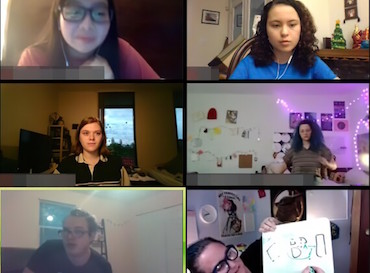
With shutdowns due to Covid-19, many theaters took to streaming pre-recorded performances or staging productions purpose-written for online delivery. But for DramaTech, theater at a preeminent technological university, the show must go on — online that is. In April, Melissa Foulger, and her students began transitioning their performance of boom to a live streaming format. Challenges included everything from learning how to rehearse over videoconferencing to questions of how to translate the immediacy of the live stage experience to a digital format. The effort to go online fits with DramaTech’s personality — experimental and technology focused. The lessons learned may be used to stage future streaming productions and can be a resource for other Atlanta theater companies.
Nunn School Students Help Brazilian Nonprofits Respond to COVID-19 Food Aid Needs
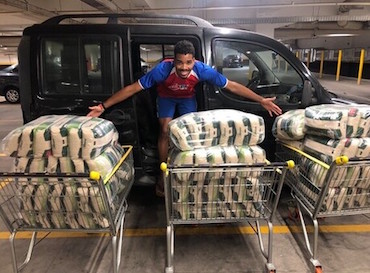
Students in the Global Social Entrepreneurship Vertically Integrated Project (VIP) are all about finding ways to help turbocharge the work of their community partners in Brazil. So, when the COVID-19 pandemic struck South America’s most populous country, these students knew they had to act quickly. The group of 13 students from across campus decided to use funds earmarked for future projects to send immediate aid to those organizations. The funds enabled them to pivot from providing high-energy youth training programs to delivering urgently needed food and sanitary supplies for at-risk residents in Rio de Janeiro.
Students Introduce Video Games that Teach Covid-19 Safety at IndieCade’s Global ‘Game Jam’
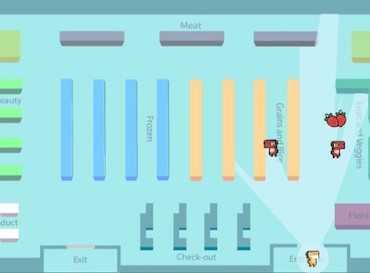
Students working in the Digital Integrative Liberal Arts Center (DILAC) in the Ivan Allen College of Liberal Arts are making the case for Covid-19 safety measures in a big way with their work as part of IndieCade’s 'Jamming the Curve' 2020 game design event. They designed two video games, and an epidemiological model to power them, and provided an explanatory video to help game designers competing in the event, which ran through Oct. 1. IndieCade is a highly regarded juried festival for independent games.

